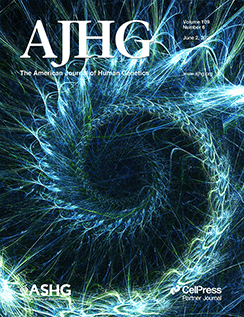spink1相关的慢性胰腺炎:一个包含变异效应、遗传复杂性和分类挑战的模型
IF 8.1
1区 生物学
Q1 GENETICS & HEREDITY
引用次数: 0
摘要
广泛使用的美国医学遗传学和基因组学学院(ACMG)/分子病理学协会(AMP)变异分类系统本质上受到其将变异分为“致病性”或“良性”的二元分类的限制,未能在复杂的人类疾病遗传结构中考虑到变异效应的全部范围。尽管提出了各种改进方案,但仍有待建立一个充分把握这一连续性的框架。为了解决这一局限性,我们对与慢性胰腺炎(CP)相关的SPINK1变异进行了深入分析,慢性胰腺炎是一种从孟德尔型到环境影响型的疾病。我们整理和回顾了在全基因组关联研究(GWASs)和非GWASs中发现的SPINK1变异。专注于预测的功能丧失(LoF)和实验表征的变异,我们通过聚合分析证明,完全或接近完全LoF的SPINK1变异导致具有中等外显率(约55%)的常染色体显性疾病。这一发现为全面破解spink1相关CP的遗传复杂性奠定了关键的基础。我们集中研究了两个特征良好的部分lof(半形态)变异,C .194+2T>;C和C . 4141g>;T(增强子),提出了一个不同的变异类别的趋同证据,该变异类别既不符合ACMG/AMP二元分类,也不符合最近提出的“风险等位基因”类别。尽管一些变异仍然被归类为不确定意义变异(VUSs),但我们提出了一个完善的分类框架,该框架整合了“风险”、“易感性”和“致病性”变异,以适应临床相关的SPINK1变异的全谱。这一完善的框架有望作为SPINK1以外的变异解释模型,为“缺失遗传力”问题提供见解,并促进对人类疾病不同背景下的变异效应和遗传复杂性的进一步探索。本文章由计算机程序翻译,如有差异,请以英文原文为准。
SPINK1-related chronic pancreatitis: A model that encapsulates the spectrum of variant effects, genetic complexity, and classificatory challenges
The widely used American College of Medical Genetics and Genomics (ACMG)/Association for Molecular Pathology (AMP) variant classification system is inherently limited by its binary categorization of variants as “pathogenic” or “benign,” failing to account for the full spectrum of variant effects within the complex genetic architecture of human disease. Although various refinements have been proposed, a framework that adequately captures this continuum remains to be established. To address this limitation, we conducted an in-depth analysis of SPINK1 variants associated with chronic pancreatitis (CP), a disorder ranging from Mendelian to environmentally influenced forms. We collated and reviewed SPINK1 variants identified in both genome-wide association studies (GWASs) and non-GWASs. Focusing on predicted loss-of-function (LoF) and experimentally characterized variants, we demonstrated through aggregation analysis that complete- or near-complete-LoF SPINK1 variants cause autosomal-dominant disease with moderate penetrance (∼55%). This finding establishes a critical baseline for comprehensively deciphering the genetic complexity underlying SPINK1 -related CP. Concentrating on two well-characterized partial-LoF (hypomorphic) variants, c.194+2T>C and c.-4141G>T (enhancer), we present converging evidence for a distinct variant category that neither aligns with the ACMG/AMP binary classifications nor fits the recently proposed “risk alleles” category. Although some variants remain classified as variants of uncertain significance (VUSs), we propose a refined classificatory framework that integrates “risk,” “predisposing,” and “pathogenic” variants to accommodate the full spectrum of clinically relevant SPINK1 variants. This refined framework is expected to serve as a model for variant interpretation beyond SPINK1 , providing insights into the issue of “missing heritability” and fostering further exploration of variant effects and genetic complexity across different contexts of human disease.
求助全文
通过发布文献求助,成功后即可免费获取论文全文。
去求助
来源期刊
CiteScore
14.70
自引率
4.10%
发文量
185
审稿时长
1 months
期刊介绍:
The American Journal of Human Genetics (AJHG) is a monthly journal published by Cell Press, chosen by The American Society of Human Genetics (ASHG) as its premier publication starting from January 2008. AJHG represents Cell Press's first society-owned journal, and both ASHG and Cell Press anticipate significant synergies between AJHG content and that of other Cell Press titles.

 求助内容:
求助内容: 应助结果提醒方式:
应助结果提醒方式:


